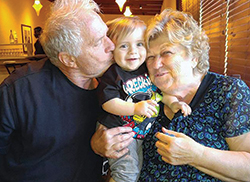Follicular Lymphoma Survivor
Advocate, Educate and Don’t Settle
 Gary Dobbs was 50 years old when he was diagnosed with Stage IV follicular lymphoma, a slow-growing type of non-Hodgkin lymphoma. He didn’t accept his first doctor’s prognosis that he only had five years left to live. He sought multiple opinions to get more information. When the cancer became active, he entered a clinical trial. Today, he enjoys retirement with his wife, Mary, his four children and three grandchildren.
Gary Dobbs was 50 years old when he was diagnosed with Stage IV follicular lymphoma, a slow-growing type of non-Hodgkin lymphoma. He didn’t accept his first doctor’s prognosis that he only had five years left to live. He sought multiple opinions to get more information. When the cancer became active, he entered a clinical trial. Today, he enjoys retirement with his wife, Mary, his four children and three grandchildren.
While exercising in 1999, I noticed a lump about the size of a ping pong ball on the inside of my right thigh. So I called the doctor. I prayed it wasn’t cancer because my mother had had multiple myeloma. After doing a biopsy, my doctor told me I had non-Hodgkin lymphoma, specifically follicular lymphoma.
He said that even though it was a slow-growing cancer, I had five years left to live. I was only 50 years old at the time, and I wasn’t ready to die. I wasn’t really emotional about the diagnosis, but it was hard to hear from my doctor that I had incurable cancer and he didn’t know how to treat it. I wanted to live.
I was not happy with my doctor, so I fired him. I became my own advocate and called multiple hospitals, universities and doctors. It was challenging because I was not an expert in follicular lymphoma. I spent up to 10 hours a day talking and researching. I even accumulated around $800 in phone bills to learn more about this disease. I also spoke with many other people with non-Hodgkin lymphoma to learn from their experiences. My wife and I drove to some of the hospitals and treatment centers in Texas, Illinois and Wisconsin to check them out and see our options. Along the way, we added little adventures to make it enjoyable. I threw my fishing poles in the back and fished in places along the way.
I found a lymphoma specialist that I felt comfortable with, and he recommended watchful waiting. A few years later, I thought I had burned the roof of my mouth on some hot pizza. My dentist, however, found a lump there and did a biopsy. It came back negative for cancer, but he ran the test again. That time, the results showed the lump was a tumor. Once I shared the news with my doctor, it was time to start treatment.
Together, we looked at my options. We agreed that the best one would be to enter into a clinical trial. There were two branches to the trial I entered. One gave an immunotherapy drug regularly whether the cancer was active or not. The other branch only gave the drug when the cancer came back. I was in the branch that got the drug whether I needed it or not. The drug specifically targeted CD20, which is a B-cell marker. I stayed on the immunotherapy drug for three years. The clinical trial saved my life. If I had listened to the first doctor, I probably wouldn’t be here today.
I had very few side effects. All I really noticed was being a little tired because the drug is given by an IV, and it can take anywhere from four hours to eight hours to complete. I didn’t have any hair loss, pain or nausea.
My wife and my family were my support through this experience, and my brothers and sisters would call and check on me. I tried to stay busy by coaching soccer. The owner of the company that sponsored Lance Armstrong had a son on one of my soccer teams. Lance later sent me an autographed picture and a letter of encouragement. I also joined the Leukemia & Lymphoma Society to fundraise. When I turned 55, I took early retirement to enjoy my time with my wife and grandchildren. It was the best decision I ever made. I consider the early retirement a blessing. Now I try to give back to others because of the kindness I received while going through the treatment. It’s important to help others.
Make sure you educate yourself about your cancer, and be your own advocate. But, be careful what you read. I think it’s helpful to join online chat groups where you can find other patients to talk to who have nothing to gain financially. Be careful when choosing a clinical trial. Different trials test different drugs and methods and they can vary from one part of the country to another. In some cases, one trial’s drug may make you ineligible for another trial. Try to find doctors that specialize in non-Hodgkin lymphoma patients for their experience and knowledge.
I recommend that people going through cancer pray, exercise and eat a healthy diet. Find good support and good laughter. Remember to joke around occasionally, and don’t be too serious all the time.
Although I have not experienced a relapse, I know that there will be treatment options available if the time comes. Now that I’m almost 70, and nearly 20 years as a survivor, I’m not as worried about my mortality as I was when I was in my fifties. I got to live a lot more life than predicted, but I do know that no one lives forever. That’s why it’s so important to be thankful. Life is precious.


